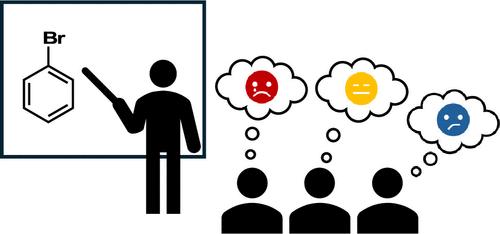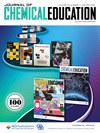Feelings of Shame in a First Semester Organic Chemistry Course: Associations between Shame and Examination Performance for Multiple Learner Groups
IF 2.5
3区 教育学
Q2 CHEMISTRY, MULTIDISCIPLINARY
引用次数: 0
Abstract
Shame is a largely understudied construct in chemistry course contexts compared to other feelings and experiences (e.g., test anxiety, motivation). Introductory organic chemistry courses offer a unique context for exploring shame as the course has a particular reputation for being difficult and many learners begin the course concerned about their performance due to its importance for future studies, both stances associated with an increased potential to experience shame. In this study, we explore shame using the Control-Value Theory lens, considering the relationship between shame and performance measures and any differences between shame experiences and learner groups (i.e., binary sex and race/ethnicity). We measured shame using the Achievement Emotions Questionnaire-Organic Chemistry (AEQ-OCHEM) in the first semester of a yearlong organic chemistry course; shame was measured in relation to the classroom, study, and testing contexts. Confirmatory factor analyses resulted in evidence of appropriate model fit, with necessary measurement invariance evidence for group comparisons. Results corroborate the theory that shame experiences are associated with performance (e.g., increased shame is associated with decreased organic chemistry examination performance). Results of two-way ANOVAs resulted in evidence of differing shame experiences by learner groups (i.e., binary sex and race/ethnicity) despite no evidence of differences by those groups in examination or overall course performance. These results suggest that chemistry instructors should be cognizant of their classroom environments, consider the messaging of high-stakes assessments, and implement activities to assist chemistry learners in coping with shame (and other negative) experiences. Researchers should consider how shame is interrelated with other measures associated with course performance (e.g., motivation, utility value) and how shame experiences across time are reciprocally associated with chemistry course performance.

第一学期有机化学课程中的羞耻感:多个学习者群体的羞耻感与考试成绩之间的关联
与其他感受和体验(如考试焦虑、学习动机等)相比,羞耻感在化学课程情境中基本上是一个未被充分研究的概念。有机化学入门课程为探究羞耻感提供了一个独特的背景,因为该课程以难度大而著称,许多学习者在课程开始时都会担心自己的成绩,因为这对未来的学习非常重要,这两种情况都会增加体验羞耻感的可能性。在本研究中,我们从控制-价值理论的角度探讨了羞耻感,考虑了羞耻感与成绩衡量标准之间的关系,以及羞耻感体验与学习者群体(即二元性别和种族/民族)之间的差异。在为期一年的有机化学课程的第一学期,我们使用成就情绪问卷-有机化学(AEQ-OCHEM)测量了羞耻感;羞耻感的测量与课堂、学习和考试情境有关。确认性因子分析结果表明,模型具有适当的拟合性,并且在进行组间比较时具有必要的测量不变性。结果证实了羞耻体验与学习成绩相关的理论(例如,羞耻感增加与有机化学考试成绩下降相关)。双向方差分析的结果表明,不同学习者群体(即二元性别和种族/民族)有不同的羞耻体验,尽管没有证据表明这些群体在考试或课程总成绩方面存在差异。这些结果表明,化学教师应认识到他们的课堂环境,考虑到高风险评估的信息传递,并开展活动帮助化学学习者应对羞耻(和其他负面)体验。研究人员应考虑羞耻感与其他与课程成绩相关的测量指标(如动机、效用价值)之间的相互关系,以及不同时期的羞耻感体验与化学课程成绩之间的相互关系。
本文章由计算机程序翻译,如有差异,请以英文原文为准。
求助全文
约1分钟内获得全文
求助全文
来源期刊

Journal of Chemical Education
化学-化学综合
CiteScore
5.60
自引率
50.00%
发文量
465
审稿时长
6.5 months
期刊介绍:
The Journal of Chemical Education is the official journal of the Division of Chemical Education of the American Chemical Society, co-published with the American Chemical Society Publications Division. Launched in 1924, the Journal of Chemical Education is the world’s premier chemical education journal. The Journal publishes peer-reviewed articles and related information as a resource to those in the field of chemical education and to those institutions that serve them. JCE typically addresses chemical content, activities, laboratory experiments, instructional methods, and pedagogies. The Journal serves as a means of communication among people across the world who are interested in the teaching and learning of chemistry. This includes instructors of chemistry from middle school through graduate school, professional staff who support these teaching activities, as well as some scientists in commerce, industry, and government.
 求助内容:
求助内容: 应助结果提醒方式:
应助结果提醒方式:


